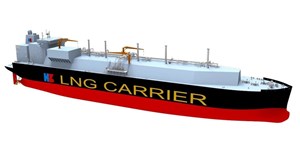API: Growing trade war with China could hurt U.S. LNG, consumers
WASHINGTON -- API issued the following statement in response to China’s increase of the retaliatory tariffs on $60 billion worth of U.S. products, including U.S. LNG:
“The U.S. and China have a natural supply-demand match when it comes to energy, but China’s increase of retaliatory tariffs to 25% poses a threat to U.S. investment in LNG by limiting our share in the world’s fastest growing LNG market,” said Stephen Comstock, API director. “These retaliatory tariffs dampen the prospects for the growing U.S. LNG investment, hurt U.S. workers, and benefit America’s foreign competitors.
“Studies show that the U.S.-China trade dispute is hurting U.S. economy and consumers. We urge both negotiating parties to quickly implement a comprehensive trade deal that would eliminate these damaging tariffs, so that American businesses and families can stop paying for this trade war.”
Bloomberg. As the U.S.-China trade war escalates, speculation is swirling over whether the Asian nation will honor purchases of American products including soybeans and cotton that are yet to be delivered.
At least 10 bulk carrier cargoes are in transit, while at least one vessel managed to offload its U.S. cargo on the weekend as tensions between Washington and Beijing flared.
Bulk carrier Fiji arrived in Dalian Sunday, waiting a week before congestion cleared to enter port. The cargo originated from Export Grain Terminal Longview in the Pacific Northwest with 67,113 metric tons of soybeans, according to U.S. Department of Agriculture and IHS shipping data analyzed by Bloomberg. China has bought about 7.4 MMt of U.S. soybeans that haven’t been shipped yet, USDA data show.
Another 468,000 t of American corn, 103,000 t of pork and 704,000 running bales of cotton also have been sold but not yet shipped to China, according to the USDA.
“The shipments of the sales on the books have been slow-walked recently,” said St. Louis-based independent analyst Ken Morrison. “The risk of possible cancellations just got higher.”
There is similar anxiety for U.S. cotton orders. “What we’ve sold to them, people are concerned they are not going to take that,” said Jody Campiche, V.P. of economics and policy analysis for the National Cotton Council of America.
China on Monday announced higher tariffs on dozens of products, including soy-based biodiesel even though China has imported virtually none of the fuel from the U.S. this year.
“While the Chinese market is only a small, emerging one for U.S. biodiesel producers right now, the proposed tariffs add to the headwinds for our industry and U.S. soybean farmers,” Kurt Kovarik, V.P. of federal affairs at the National Biodiesel Board, a trade group, said Monday in an emailed statement.
In the energy sector, a tanker of liquefied natural gas -- which has also been targeted with tariffs -- is also en route. The Iberica Knutsen left Cheniere Energy Inc.’s Sabine Pass terminal April 10 and is now headed for Taizhou, according to Genscape data.
Supertanker Alsace is also steaming for China’s northeastern port of Qingdao, after loading up U.S. crude oil in the Caribbean. The ship received part of its West Texas Intermediate crude cargo while in the U.S. Virgin Islands and more off of Aruba. The tanker, which is carrying about 2 million barrels of oil, is set to reach its final destination May 21.
Click here for a table of USDA grain exports by country. Click here for a list of U.S. LNG exports



